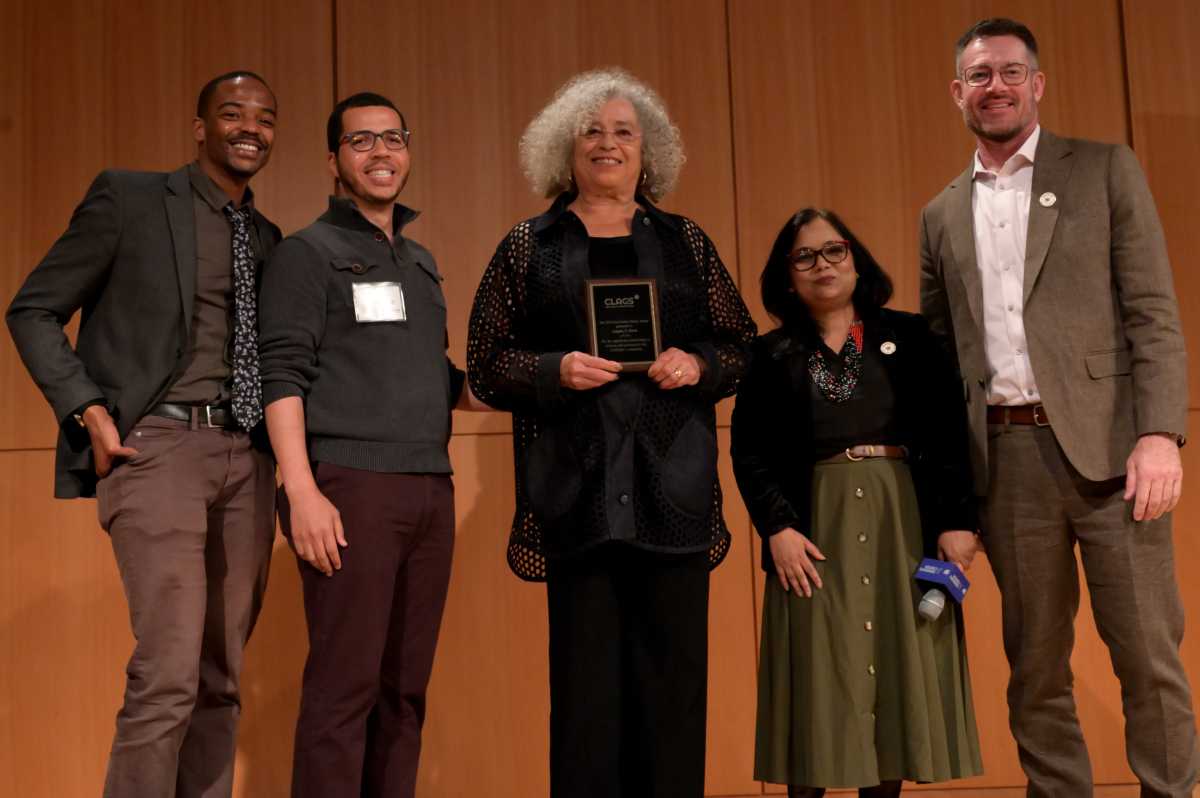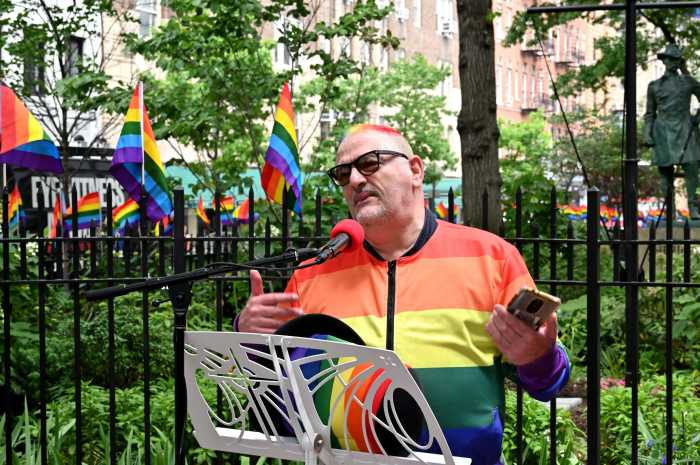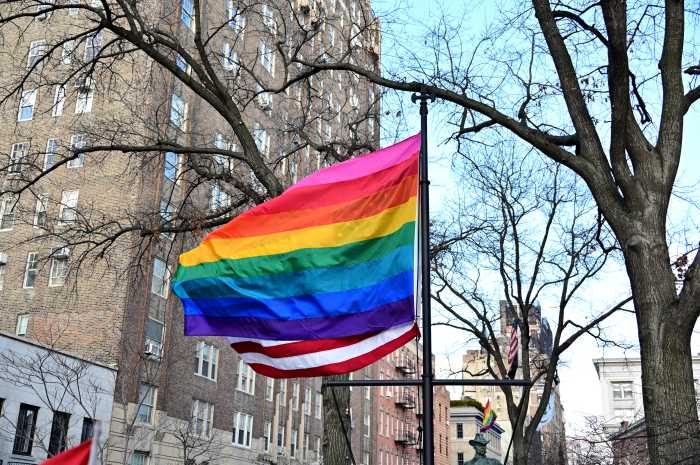“How honored I am to be here and to be the recipient of the José Muñoz Award,” said the eminent scholar and activist Angela Y. Davis, seated on stage at the Proshansky Auditorium at the City University of New York (CUNY) Graduate Center in midtown Manhattan.
The award, named for José Esteban Muñoz, a pathbreaking academic in queer theory before his premature death in 2013, has been bestowed annually since 2015 by “CLAGS: The Center for LGBTQ Studies” upon a figure notable for broadening knowledge of LGBTQ realities.
Davis, 81, has stood at the forefront of social justice movements for over 60 years.
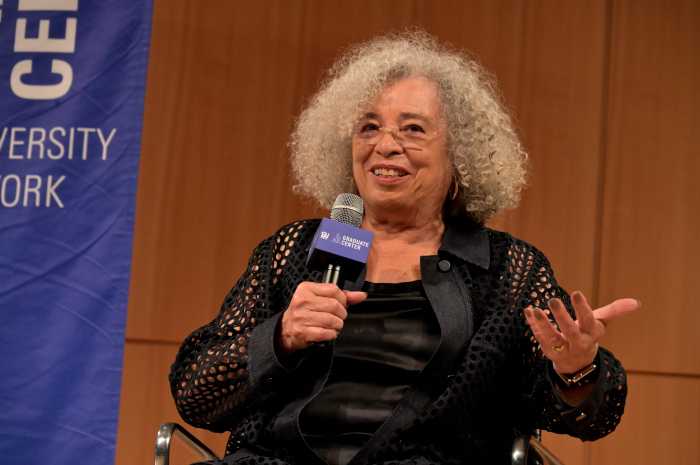
With a career too voluminous to detail — longtime leader and reformer in the Communist Party; prominent Black Panther Party member; prosecuted on charges of murder, kidnapping, and conspiracy by the federal government in a media-saturated trial that saw her incarcerated for 18 months, triggering global outcry and a “Free Angela” campaign ahead of her full acquittal; author of nine books and numerous other texts; subject in diaries, dissertations, documentaries aplenty; distinguished professor and sought-after public speaker — Davis has influenced generations of critical thought on race, class, capitalism, feminism, queer and trans rights, and the prison-industrial complex and prison abolition movement. Even her physicality in earlier years as a young Black woman with imposing Afro hairstyle endures as a recognizable, if romanticized, symbol of the radical left.
“You’re iconic,” said Debarati Biswas, co-chair of the CLAGS board of directors, Davis’ interlocutor for the event.
Davis graciously demurred. “I always see myself as being on the other side,” she responded. “Challenging the icons.”
Indeed, as cultural critic Nelson George wrote of her trajectory in an encyclopedic 2020 New York Times article, “Davis has kept her fire while relishing what she can learn from younger generations.”
The auditorium and an overspill room were fully packed, and hundreds more tuned in online, “a record attendance in the 40 years of CLAGS history,” said Matt Brim, CLAGS executive director. (The organization was founded as the “Center for Lesbian and Gay Studies” but shed the title and retains only the acronym to be fully inclusive.)
“CLAGS believes in free, accessible LGBTQ studies for everyone,” Brim said. “This is our mantra, and it very much shares the spirit of Angela Davis’ activism. Majority learning is indebted to minority understandings.”
Audience member Velina Manolova, who teaches humanities and media studies at Pratt and NYU, said she’d seen Davis speak a couple of times before, but appreciated the conversational format of this event.
“It created a space for Professor Davis to really reflect on her life experiences and how her scholarship and her activism have always been grounded in those experiences,” she said.
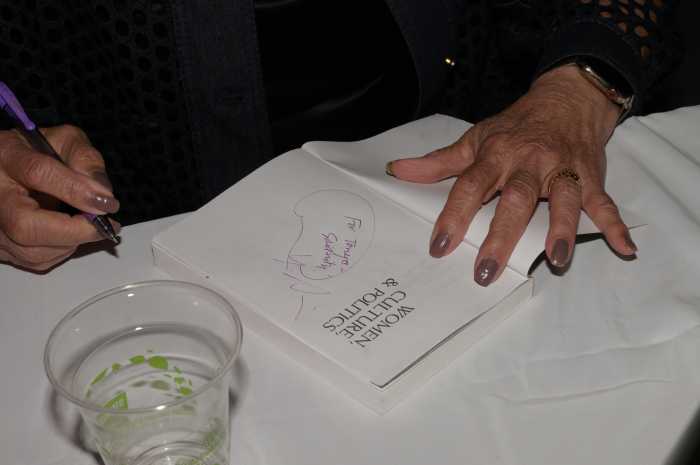
While California has been Davis’ base for decades, New York City, specifically Greenwich Village, was pivotal to her formative years. “New York is your home. But, it also became your prison,” Biswas said to Davis at one point.
Born in Birmingham, Alabama, Davis came to New York in 1959 on a scholarship to attend high school.
“I went to Little Red School House, Elisabeth Irwin High School,” she said, to audible delight from the audience. “I always like to point out that it was at Elisabeth Irwin – ‘EI’ – where I read ‘The Communist Manifesto’ for the first time, when I was about 15.”
Just shy of 11 years later, at age 26, Davis would find herself locked up mere blocks from the school in the New York Women’s House of Detention (a notorious facility shut down in 1974), awaiting extradition to California to face the trial that would make of her the most memorable cause célèbre of any Black American woman in 20th century history, probably ever.
“There was a very vibrant LGBTQ culture [in ‘the House of D.,’ as it was called],” Davis said. “Which I did not really fully understand because it was the first time I was confronted [with such a situation].”
Over the course of her nine-week detention, Davis learned much about the semi-formal kinship structure among inmates, who adopted one another as “daughters” and “fathers,” roles designed to provide not only intimacy, but counsel and financial support. The revelation was, for Davis, an early education in what she would later term, “unlikely and unprecedented coalitions.”
Davis fiercely opposes “simplistic identity politics,” seeing greater potential in solidarities across all categories such as race, gender and sexuality. “We have to transcend all of those things that are different in order to achieve what it is we all have in common,” she insists.
As such, she said it is crucial that the prison abolition movement pay close attention to “insights that we acquire about the entire system by looking at the experiences of trans persons.”
Specifically, she cautioned against myopic analysis of the current debate surrounding where to place transgender people serving time.
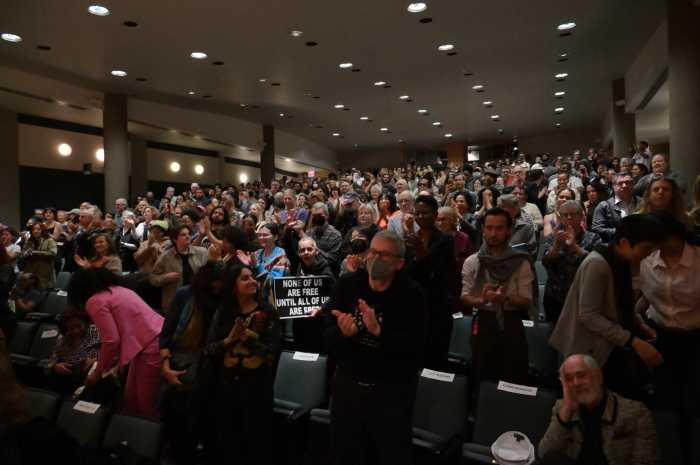
“We [should] learn how to go beyond just protesting that trans women are being incarcerated in male prisons,” she said. “We learn how to challenge the gender-based organization of the institution itself, which allows us to begin to think about the prison system as a gendering apparatus. And that’s a very different insight.”
In response to a question from the audience about the war in Gaza, Davis said, “Those of us who’ve been involved in Palestine solidarity are experiencing a moment that’s so contradictory because, on the one hand, it’s just so painful and so much grief because of all of the people who are being made the targets of the Israeli state and the IDF and what’s happening in Gaza and what’s happening in the West Bank. But, then, on the other hand, this kind of engagement with Palestine solidarity is what many of us have been struggling for for decades. So, I want to smile and then I want to cry at the same time because it should not require these tragedies to stimulate people to do the work.”
Reflecting on her first visit to Palestine, in 2011 (leading a delegation of feminists of color that included scholars Chandra Talpade Mohanty, who was present in the audience, and Gina Dent, Davis’ life partner), Davis concluded, “The prison abolition movement was very much inspired by struggles in Palestine. Palestinians taught us that the carcerality can be shifted [out of the prisons] to the community and can do as much, or even more, damage. It’s not just about the bars and the chains and that [which is] overtly repressive. It is about control. It’s about how control can be exercised without all of what we generally visualize as the tools of imprisonment.”
Previous recipients of the José Muñoz Award include television producer and author Janet Mock, journalist and immigration-rights advocate Jose Antonio Vargas, and performance artist Alok Vaid-Menon.
Nicholas Boston, Ph.D., is associate professor of media sociology at The City University of New York, Lehman College. He was recently elected to the board of directors of CLAGS.

